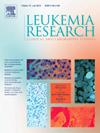Clinical and therapeutic significance of genetic profiling in adult T-cell leukemia/lymphoma
IF 2.1
4区 医学
Q3 HEMATOLOGY
引用次数: 0
Abstract
Adult T-cell leukemia/lymphoma (ATLL) is a highly aggressive T-cell malignancy with a poor prognosis. Several genetic analyses using next-generation sequencing have uncovered recurrent mutations and copy number alterations involved in diverse functional pathways, including T-cell receptor/NF-κB signaling, immune surveillance, transcription factors, chemokine receptors, and CIC-ATXN1 complex. In addition to these alterations, recurrent structural variations, including PD-L1 (CD274) and REL truncations, characterize ATLL genome. Recent clinicogenetic studies have linked several genetic alterations, such as PRKCB mutations, to a worse clinical outcome. Using genetic and clinical factors, novel prognostic models have been developed, which outperform previous models based on only clinical factors in prognostic prediction. Furthermore, genetic and epigenetic events influencing response to molecularly targeted therapies, such as mogamulizumab and valemetostat, have also been identified. Collectively, these insights underscore the clinical importance of assessing genetic alterations. This review highlights the latest insights into the genetic landscape of ATLL and their clinical implications, which will facilitate the development of future strategies for targeted and personalized therapy.
成人t细胞白血病/淋巴瘤基因谱分析的临床和治疗意义
成人t细胞白血病/淋巴瘤(ATLL)是一种高度侵袭性的t细胞恶性肿瘤,预后较差。使用新一代测序技术的一些遗传分析揭示了涉及多种功能通路的复发突变和拷贝数改变,包括t细胞受体/NF-κB信号传导、免疫监视、转录因子、趋化因子受体和CIC-ATXN1复合物。除了这些改变,复发性结构变异,包括PD-L1 (CD274)和REL截断,是ATLL基因组的特征。最近的临床遗传学研究将一些基因改变,如PRKCB突变,与较差的临床结果联系起来。利用遗传因素和临床因素,开发了新的预后模型,在预后预测方面优于以往仅基于临床因素的模型。此外,还发现了影响分子靶向治疗反应的遗传和表观遗传事件,如mogamulizumab和valemetostat。总的来说,这些见解强调了评估基因改变的临床重要性。这篇综述强调了ATLL基因景观的最新见解及其临床意义,这将促进未来靶向和个性化治疗策略的发展。
本文章由计算机程序翻译,如有差异,请以英文原文为准。
求助全文
约1分钟内获得全文
求助全文
来源期刊

Leukemia research
医学-血液学
CiteScore
4.00
自引率
3.70%
发文量
259
审稿时长
1 months
期刊介绍:
Leukemia Research an international journal which brings comprehensive and current information to all health care professionals involved in basic and applied clinical research in hematological malignancies. The editors encourage the submission of articles relevant to hematological malignancies. The Journal scope includes reporting studies of cellular and molecular biology, genetics, immunology, epidemiology, clinical evaluation, and therapy of these diseases.
 求助内容:
求助内容: 应助结果提醒方式:
应助结果提醒方式:


